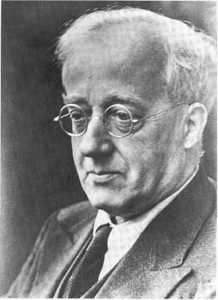Oh my. This was going to be a straightforward review of my favorite recording of one of my favorite orchestral works, Gustav Holst’s The Planets. However, having done my research I have come face to face with an issue and an attendant moral dilemma that has caused me to question whether (or not) I should have recommended this recording and, having done so, by what justification.

Gustav Holst
Gustavus Theodore von Holst was born on September 21, 1874 and died on May 25, 1934, four months short of his sixtieth birthday. Despite his dauntingly Teutonic name, he was an Englishman through and through: born in Cheltenham and educated at the Royal College of Music in London, where he lived most of his life and where he died.
The biographical substance of Holst’s life can be outlined with shocking ease. A small, frail, short-sighted and asthmatic child, he had to abandon his ambition to be a professional pianist due to neural inflammation in his right arm. Instead, he became a composition student of Charles Stanford at London’s Royal Academy. He failed to win a scholarship and was, according to Stanford:
“hardworking but not at all brilliant.”
After graduating he took a job teaching at the James Allen’s Girls’ School in Dulwich, a high-end ‘burb in South London. Two years later – in 1905 – he took the position of music director at St. Paul’s Girls’ School in Hammersmith (in West London), a job he held for the duration.
Holst’s teaching and evening music gigs forced him to become a “weekend warrior:” someone who composed on weekends and during the vacation month of August. Along the way he married and had one child: a daughter named Imogen Claire Holst.

It’s thanks to Imogen that we know anything about her reclusive father. She wrote:
“Holst never considered The Planets his best work. Its success bewildered him. He used to say that every artist ought to pray not to be a success: ‘If nobody likes your work, you are in no danger of letting the public make you repeat yourself.’ But [after The Planets], he had achieved the position, rare for an Englishman, of being a really popular composer. It was a position that he would gladly have avoided. When audiences ‘rose to their feet with tumultuous applause’, he gazed at them in blank dismay. He dreaded having to go to parties where he was surrounded by gushing admirers.”
The Planets
The Planets – composed between 1914 and 1916 – consists of seven movements: Mars, Venus, Mercury, Jupiter, Saturn, Uranus, and Neptune. As the piece is about astrological signs and not astronomic verisimilitude, Holst did not write a movement entitled “Earth” (or “Terran” or “Tellus” or “Gaia” or whatever). Neither did he compose a movement in honor of Pluto, which is understandable given that Pluto was not “discovered” until 1930, fourteen years after Holst completed The Planets.
According to Holst, The Planets is a series of “mood pictures, with the movements acting as foils for one another.” As such, each movement represents the “expressive embodiment” of the astrological character named in its subtitle. For example, the subtitle of the first movement – “Mars” – is “The Bringer of War”.
Overall, The Planets maps an expressive journey, from, in the words of Holst scholar Richard Greene:
“The physical, aggressive, and profligate [in the first movement ‘Mars’] to the mystical, passive, and stoic which lingers as the final strains of ‘Neptune’ evaporates in space around us.”
The ordering of the movements in The Planets does not correspond with the physical order of the planets in the solar system. Holst’s order starts with the fourth rock from the sun and moves inwards: Mars, Venus, and Mercury, and only then moves outwards, from Jupiter to Saturn to Uranus and finally, to Neptune
